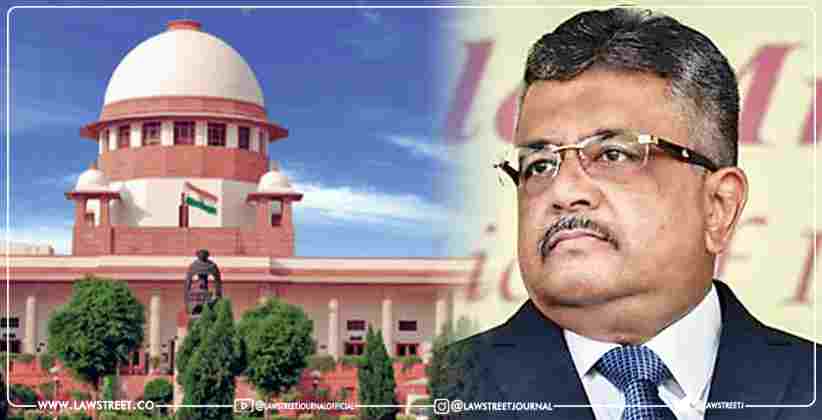Solicitor General Tushar Mehta argued before the Supreme Court in a series of petitions challenging the provisions of the Prevention of Money Laundering Act, 2002 (PMLA), that the petitioners' assertion stating that the PMLA is not in compliance to the Code of Criminal Procedure (CrPC)is false. It must be constitutionally compliant, he continued, but it does not have to be CrPC compliant.
A three-judge bench consisting of Justice AM Khanwilkar, Justice Dinesh Maheshwari, and Justice CT Ravikumar noted, "A law should be drafted in such a manner that a common man understands it. It is for the common man, not for a legal mind. Since you are taking so long to understand, think about the plight of a common man."
The bench was hearing a slew of petitions challenging provisions of the Prevention of Money Laundering Act, including one in which Justice Khanwilkar stated that "one is attachment and one is registration of offence. There has to be a registration of offence for the attachment of the proceeds of crime," in response to a question about provisional attachment of property.
In response, Solicitor General Tushar Mehta stated that the Enforcement Director Officer will first notify the police officer and then attach the property for the purpose of prosecution, but that it is only a temporary arrangement, "I'll have to have the material, otherwise I'll face consequences, whereas the attachment prevents it from being transferred or used."
Solicitor General Tushar Mehta responded to the petitioner's contention that the Prevention of Money Laundering Act has no standing under the Criminal Procedure Code (CrPC), claiming that "whereas in the Criminal Procedure Code, an officer can arrest even on suspicion, even on suspicion that it is a property of theft, he can cease it. Here we have layers of rules for protection.
Furthermore, Mehta stated that the Prevention of Money Laundering Act is a comprehensive statute, but the Criminal Procedure Code is a general law, and that police personnel do not need to record reasons under the Criminal Procedure Code, whereas they will be required to do so under the PMLA.
According to the rules, property and money attached after a conviction for money laundering may be returned to the claimant who sustained a loss; as a result of this rule, we have returned Rs. 18,000 crores to the banks attached by absconding business people.
Mehta further said that the FATF (Financial Action Task Force) performs audits, and that the FATF's usual evaluation report from 2012 stated that India's money laundering definition isn't consistent with the Vienna Convention, despite the fact that we adhered. It would be important for our international stability if we were to be consistent.
On Tuesday, March 1, 2022, Solicitor General Tushar Mehta will complete his submissions.
Earlier, senior counsel Menaka Guruswamy, representing the petitioner, argued that while the number of convictions in PMLA cases is low, the number of appeals by the Enforcement Directorate (ED) should be higher, but that is not the case. She stated that the ED did not file any appeals in 2010 or 2011.
NOW THE QUESTION IS: WHAT IS FATF?
The Financial Action Task Force (FATF) is the international watchdog on money laundering and terrorism financing. The intergovernmental group establishes international standards with the goal of preventing illicit actions and the societal harm they inflict. The FATF, as a policy-making agency, aims to build the political will needed to implement national legislative and regulatory reforms in these areas. More than 200 nations and jurisdictions have committed to putting them in place. The FATF Recommendations, also known as FATF Standards, ensure a coordinated global response to fight organised crime, corruption, and terrorism. They assist police in pursuing the assets of criminals involved in illegal drug trafficking, human trafficking, and other crimes. The FATF also strives to prevent weapons of mass devastation from being funded. The FATF examines money laundering and terrorist funding strategies and updates its guidelines as needed to handle emerging threats, such as the regulation of virtual assets, which has grown in popularity as cryptocurrencies have grown in popularity. The FATF monitors countries to verify that they are fully and effectively implementing the FATF standards and holds those who do not comply accountable. [1]
WORKING OF FATF
A Group of Seven summit in Paris in July 1989 established the Financial Action Task Force (FATF) to study and implement methods to prevent money laundering. The FATF's scope was broadened in October 2001 to include measures to fight terrorist financing. In April 2012, it increased its efforts to combat the financing of the proliferation of weapons of mass destruction. ([2] The United Nations formed the Financial Action Task Force (FATF) to combat money laundering, terrorist funding, and other risks to the integrity of the international financial system. The FATF keeps track of nations' progress in adopting the FATF Recommendations, examines money laundering and terrorist funding strategies and countermeasures, and promotes FATF recommendations' adoption and global adoption.[2]
Case Title: Vijay Madanlal Chaudhary and Ors. vs Union of India & Other [3]
[1] & [2] https://www.fatf-gafi.org/about/whatwedo/
[3] CIVIL APPEAL NO. 10887 OF 2021








